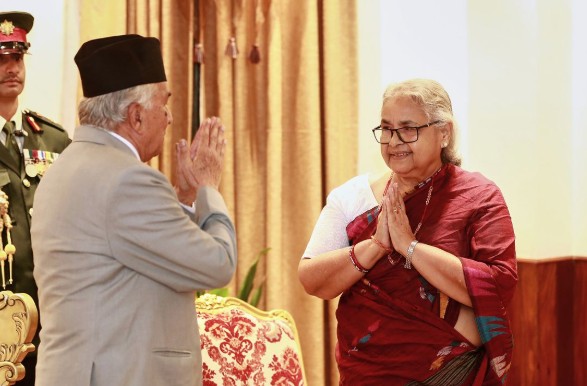Nepal’s Interim Prime Minister Sushila Karki Vows to Serve Only Six-Month Term

Pledges to Stabilize Government and Oversee Fair Elections Following Turbulent Political Shift
In a pivotal moment for Nepal’s fragile democracy, Interim Prime Minister Sushila Karki has declared that her time in office will not exceed six months. Speaking at a press conference in Kathmandu on Sunday, Karki emphasized that her temporary leadership is focused solely on restoring stability and preparing the nation for transparent, democratic elections.
“This is a transitional mandate,” Karki said. “My duty is to help Nepal return to democratic normalcy through peace, order, and fair elections within the next six months.”
Karki, 73, a former Chief Justice of the Supreme Court and a respected figure in Nepalese civic life, was appointed following the collapse of the previous government amid widespread protests and allegations of deep-seated corruption.
Political Upheaval and Gen Z Mobilization
Karki’s appointment comes in the wake of weeks of intense civil unrest, during which over 70 people lost their lives in violent confrontations between demonstrators and security forces. The protests, initially led by a decentralized youth led movement known as the “Gen Z Coalition,” called for sweeping anti-corruption reforms, government accountability, and generational change in leadership.
The former administration, heavily criticized for failing to address allegations of embezzlement and bureaucratic abuse, was forced to resign following a no confidence vote in Parliament last month. After weeks of deadlock, leaders of major political parties and Gen Z representatives agreed to support Karki as a neutral interim leader.
A Caretaker with a Mission
During her statement, Karki laid out her priorities for the coming months:
Ensuring free and fair general elections within the six-month time frame
Restoring rule of law and accountability within government institutions
Creating space for peaceful political dialogue between youth leaders, civil society, and traditional parties
Establishing an independent election commission with cross-party approval
“The people have spoken clearly they want a clean, functional, and representative democracy,” Karki said. “We must listen and deliver.”
Though Karki is not affiliated with any political party, her appointment has received cautious support from across the political spectrum, as well as praise from international observers.
Regional and International Response
Nepal’s neighbors, including India and China, have welcomed the appointment as a step toward regional stability. The United Nations Office in Nepal released a statement commending the peaceful transition and encouraging all political actors to support the electoral roadmap.
“Nepal’s political resilience will be tested in the months ahead, but Karki’s appointment offers a critical opportunity to reset democratic norms,” said Lama Dorji, a political analyst at Tribhuvan University.
Looking Ahead
As Nepal enters this transitional period, questions remain about how entrenched elites will respond to the rapid political changes and whether the Gen Z movement now a recognized political force will sustain its momentum.
Karki, however, remains focused.
“This office is not a throne,” she concluded. “It is a responsibility, and I will carry it only as long as the people require.”

tayabet https://www.yetayabet.net